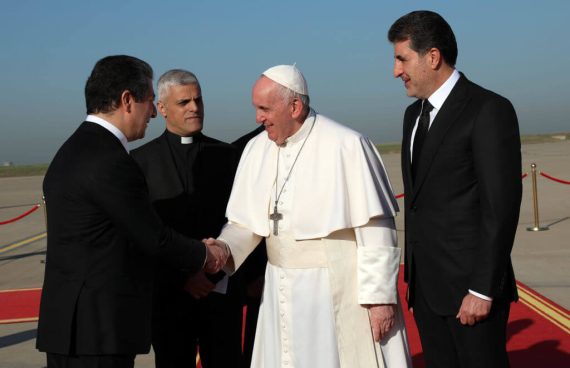Pope Francis’s recent trip to Iraq is considered of historical importance both for its strong symbolic message and its political and diplomatic impact on regional developments. During his trip, which lasted three days (March 5-8), the highest authority of the Catholic Church visited the main cities and key places of Christianity in Iraq and held important meetings.
It is certainly not the first time that a pope expresses his will to visit Iraq, the land of the prophet Abraham and a country that has been tormented by many wars. Indeed, back in 1999, Pope John Paul II had to give up the idea for safety reasons. Pope Francis announced his arrival in Iraq on his so-called pastoral journey in a video-message by saying, “I come as a penitent pilgrim to implore forgiveness and reconciliation from the Lord after years of war and terrorism; to ask God for the consolation of hearts and the healing of wounds.”
The final goal of the trip was to bring comfort to Iraqis and especially to the Christians among them who have suffered from harsh persecution and destruction at the hands of Daesh (ISIS). In the spirit of solidarity and goodwill, Pope Francis declared, “From you, millennia ago, Abraham began his journey. Today, it is up to us to continue it, with the same spirit, along the paths of peace together!” The same words were taken up by the highest Iraqi institutional leaders. Both the President of the Republic Barham Salih and Prime Minister al-Kadhimi expressed their confidence that the visit is a message of peace for Iraqis of all religions and that it will help consolidate domestic and regional stability.
The supreme pontiff aimed to reaffirm the Christian presence as an important element of both the country’s and the region’s population. Hence, his first stopover in Baghdad was the Syriac Catholic Cathedral of Our Lady of Salvation, where a meeting with the exponents of the Christian community took place. Throughout recent history, Christian groups in Iraq have suffered and been forced to flee – especially after the fall of S H, following the U.S. invasion in 2003. From that moment, a spiral of violence and ethnic conflict began.
It is estimated that during Saddam’s regime, more than one million Christians lived in Iraq while nowadays they are around 300,000.
The massive destruction and hate campaign launched by Daesh has contributed to the further tearing apart of an already bleeding country. In recent years, many Iraqis have been forced to leave their homes and Christians, in particular, have been badly affected by the wartime conditions. It is estimated that during Saddam’s regime, more than one million Christians lived in Iraq while nowadays they are around 300,000. Currently, Iraqi law declares that “each Iraqi has the right to freely exercise his religion.” Islam, however, is “the state religion and the most important source for legislation” according to Article 2 of the Constitution of Iraq.
The pope’s visit to the Grand Ayatollah Ali al-Sistani in Najaf is considered the turning point of the visit to Iraq. Pope Francis is the first supreme pontiff and state representative to meet with Ayatollah Sistani. This is both a religious and political event. From the perspective of interreligious dialogue, their private conversation aimed at reaffirming the equality of all ethnic and religious components of Iraq and the region.

VIDEO: Head of the Catholic Church to embark on first-ever Iraq visit
Actually, it is not the first time that the Vatican has emphasized this principle of equality among all religious groups. In 2019, in Abu Dhabi, Pope Francis and Ahmad al-Tayyeb, the grand imam of Al-Azhar, signed the “Document on Human Brotherhood” which also tackled the issue of equality. – In fact, with a post on Twitter, al-Tayyeb wished Pope Francis success on his trip to Iraq. In a similar vein, the note published by Ayatollah Sistani’s office stressed the commitment to making “Christian citizens live like all Iraqis in peace and security, with all their constitutional rights.”
The private conversation between Pope Francis and Ayatollah Sistani, however, also had a clear political message with some regional spillovers, especially regarding the relationship with neighboring Iran and its cross-border influence. As is known, the city of Najaf is the direct competitor of Qom in terms of Shiite supremacy. Hence besides being a very influential figure, Ayatollah Sistani has always opposed Iran and its influence over Iraq.
Pope Francis acknowledged Ayatollah Sistani as his main interlocutor in the Shiite world and accepted him as the religious authority in Iraq in order to obtain greater guarantees for the protection of the Christian community.
This dichotomy, stemming from different interpretations of religion and power, is so deep and dividing that in the past the ayatollah refused to receive Ebrahim Raisi, one of greatest exponents of the Iranian state apparatus who was portrayed as a possible successor of Khamenei. Pope Francis acknowledged Ayatollah Sistani as his main interlocutor in the Shiite world and accepted him as the religious authority in Iraq in order to obtain greater guarantees for the protection of the Christian community.
On the other hand, to achieve peace, the ayatollah has shown a preference to dialogue with the pope: the former signed a tacit pact of collaboration, which sounds like a subtle accusation against Tehran. “I hope that religious and spiritual leaders will urge interested parties, and especially the great powers, to give priority to reason and wisdom by renouncing the language of war.… [they] should not put their own interests first at the expense of the rights of peoples to live in freedom and with dignity,” the note reads.
The pope’s journey continued to Mosul and to Qaraqosh, the largest Christian-populated city of Iraq, whose biggest sanctuary was burned and desecrated by Daesh in the summer of 2014, forcing thousands of people to flee. However, the exodus of Christians from these lands is in continuity with the past – Christians were also forced to flee following the U.S.-led military operations “Desert Storm” in 1990 and “Iraqi Freedom” in 2003.
Recommended
The last stopover for Pope Francis was Erbil, the capital of the autonomous Iraqi Kurdish Regional Government (KRG), where he celebrated a public mass in the Franso Hariri Stadium. Afterwards, he welcomed the father of Alan Kurdi, the child who became a symbol of the tragedy endured by refugees as he was found dead on Turkish shores after their boat to Europe capsized.
The pope also visited a refugee camp that hosts displaced people who have fled Daesh. In the short period of three days, Pope Francis highlighted some of the deepest fractures and cleavages of our times in gestures symbolizing the flourishing of life over destruction and terrorism.
Pope Francis tried to bring hope and a spirit of unity to a region of the world where leaders do not go and where their efforts have proven unsuccessful. However, in this relaxed and festive atmosphere, there was margin for manipulation and an unfortunate attempt took place that aimed to create further problems and divisions.
While Pope Francis shared his thoughts on the visit, thanking the Kurds in Iraq for their friendship and warm welcome via Twitter, one of the commemorative stamps issued by the Kurdish Regional Government appeared to contain a map including some Turkish provinces.
The press release by the Turkish Ministry of Foreign Affairs accurately stated that this move is completely disrespectful of the territorial integrity of a neighboring country. As a result, Ankara has expected – and after weeks has yet to receive – “an urgent and clear statement from the KRG authorities that immediately rectifies this grave mistake.” In return, the KRG replied that the stamps including the Turkish regions “were only proposals and that none of them had been approved by the government to be published.”
No doubt the stamp initiative reflects an ideologically oriented distortion of the meaning of this historical visit. The ill-conceived effort, without a doubt the fruit of political calculations, aimed at exploiting the widespread enthusiasm and feeling of hope that Pope Francis’s mission brought to Iraq and the wider region.





